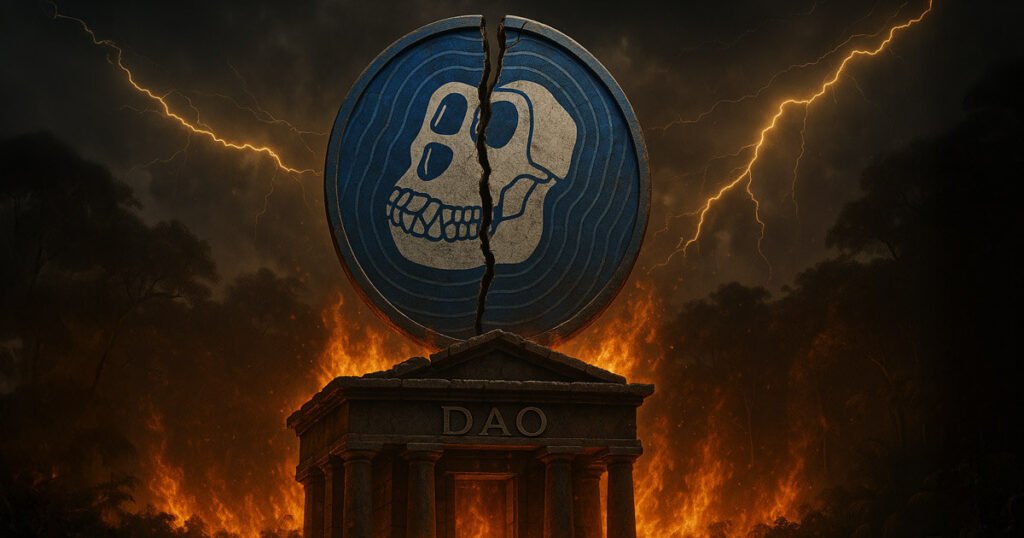ApeCoin DAO Dissolution: Transitioning to ApeCo
Yuga Labs has put forth a significant proposal to dissolve the ApeCoin DAO, a notable shift in the governance structure of the community surrounding one of Web3’s most recognized tokens. Filed as an AIP proposal on June 5, this plan suggests a consolidation of power and resources into a newly established entity known as ApeCo. This proposed change comes amid rising discontent regarding the DAO’s effectiveness, positioning Yuga Labs to reassert control over the Ape ecosystem. With the potential to sunset the DAO, all critical assets—including treasury funds, intellectual property rights, smart contracts, and administrative functions—would transfer to ApeCo, heralding a new chapter for the Ape community.
The Context of Dissatisfaction
The dissatisfaction with the current state of the ApeCoin DAO has been articulated by Greg Solano, co-founder of Yuga Labs. He describes the DAO as having become "sluggish, noisy, and often unserious,” emphasizing the urgent need for a more agile governance model. The goal, according to Solano, is to revitalize the ApeCoin initiative by establishing a "leaner, faster organization." He has indicated that “people want to kill the ApeCoin DAO,” laying the groundwork for the proposed transition to ApeCo.
If approved, ApeCo would take charge of managing key elements such as the grant program and the development of ApeChain, which are essential for brand initiatives in the expanding Bored Ape Yacht Club ecosystem. Currently, the DAO holds around 169 million APE tokens, valued at over $168 million, which would transition into ApeCo’s control, allowing for more streamlined decision-making processes.
DAO’s Performance Under Scrutiny
Initially founded in March 2022, the ApeCoin DAO aimed to guide the community-driven growth of the Ape ecosystem through decentralized governance. However, the DAO has faced growing scrutiny regarding its operational effectiveness and low voter engagement, prompting core stakeholders and Yuga Labs to voice their concerns. The initial changes implemented in January through AIP-582, which shifted governance on-chain via ApeChain, garnered significant support but have ultimately led to this new proposal, which seeks to entirely dissolve the DAO and centralize authority within ApeCo.
The proposal to transition to ApeCo effectively negates earlier governance changes, reiterating the dissatisfaction that many core stakeholders feel. This endeavor represents a critical moment in the evolution of the Ape ecosystem, questioning the long-term viability of decentralized governance, particularly in fast-paced environments that demand rapid innovation.
Community Response and Concerns
Community reactions have predominantly leaned towards support for the proposed changes, with many forum comments reflecting optimism about the transition to ApeCo. However, dissenting opinions persist; for instance, DAO contributor Lanzer has raised concerns about the ramifications of categorically declaring the DAO a failure. He warns of potential reputational harm that could arise from dissolving the existing governance model entirely. The reactions encapsulate the wider tension between traditional governance models and innovative decentralized frameworks in the evolving crypto landscape.
Should this proposal be approved, it would represent a significant rollback of one of the largest DAOs in recent memory, showcasing the complexities and challenges facing decentralized governance in the crypto sector. The reaction, both supportive and critical, reflects a broader discussion around governance structures that can adequately support rapid innovation while remaining accountable to the community.
Regulatory Context
The proposal comes at a pivotal moment, particularly following the SEC’s decision in March to close its investigation into Yuga’s NFT offerings without imposing charges. This regulatory clarity eliminates a significant burden, paving the way for Yuga Labs to reassert its authority and direction over the Ape ecosystem. With the AIP in the idea stage, a full approval via DAO voting will be necessary before implementation can begin. Major stakeholders, including significant token holders and venture backers, will have the ability to amend or reject the proposal, highlighting the collaborative nature of decision-making even within a proposed centralized governance structure.
If the transition to ApeCo occurs, immediate focus will shift to operational logistics involving the transfer of smart contract ownership and treasury management. These changes will be crucial in determining how effectively ApeCo can manage grant disbursements and overall governance moving forward.
A New Era for Ape Governance
The proposed transition to ApeCo signifies a foundational shift in the governance framework for one of the cryptocurrency scene’s most recognizable brands. While the aspirations of decentralized governance remain, the challenges faced by the ApeCoin DAO illustrate that such frameworks may struggle under pressures of rapid innovation and change. The new structure aims to be focused, professionalized, and agile, dedicated to executing strategic growth plans for the Ape ecosystem’s extensive assets, including Otherside and ApeChain.
By adopting this new governance model, Yuga Labs hopes to enhance decision-making speed and operational efficiency, all while maintaining a commitment to the community’s values and vision. Ultimately, ApeCo’s establishment may set a precedent for future transitions from decentralized structures back to more centralized forms of governance, reshaping how communities govern capital and intellectual property in the burgeoning Web3 space.


